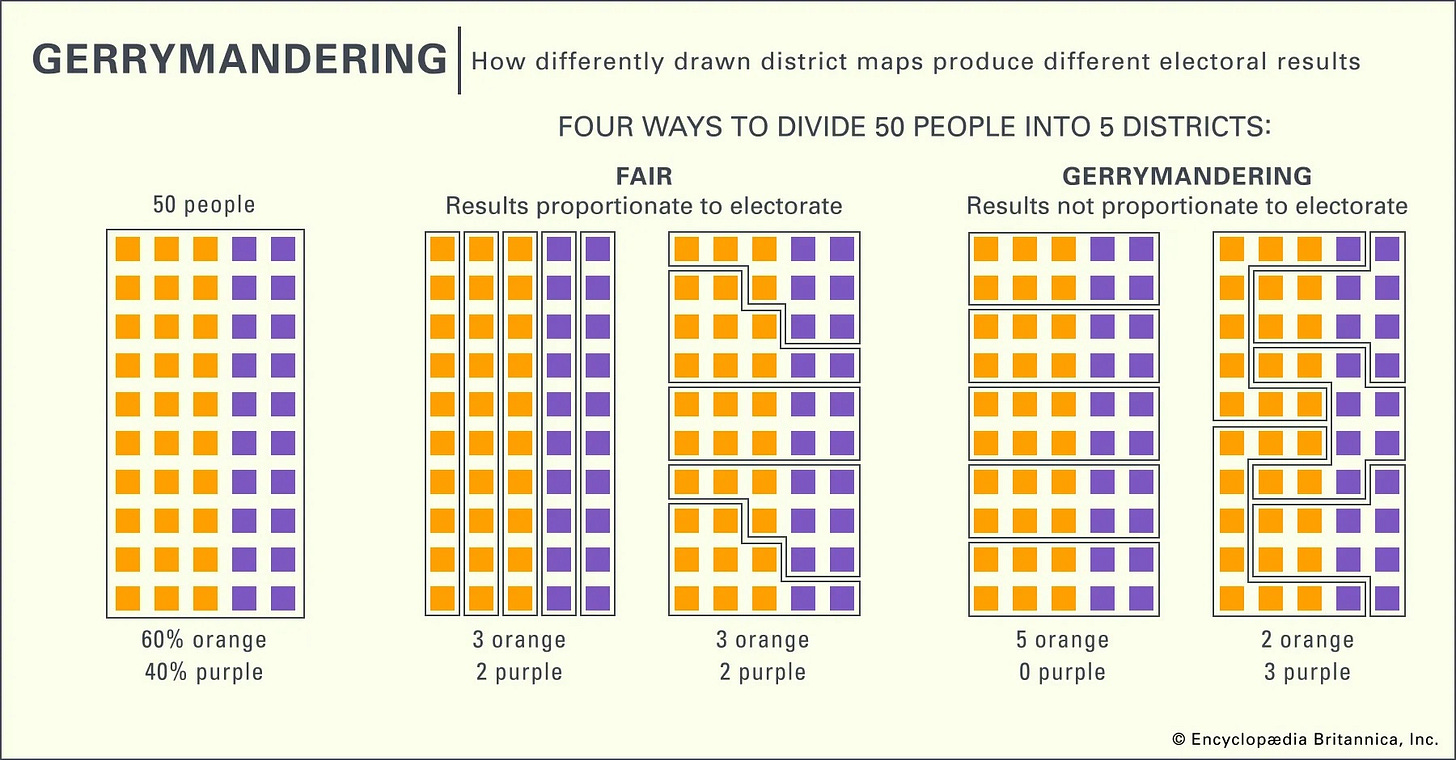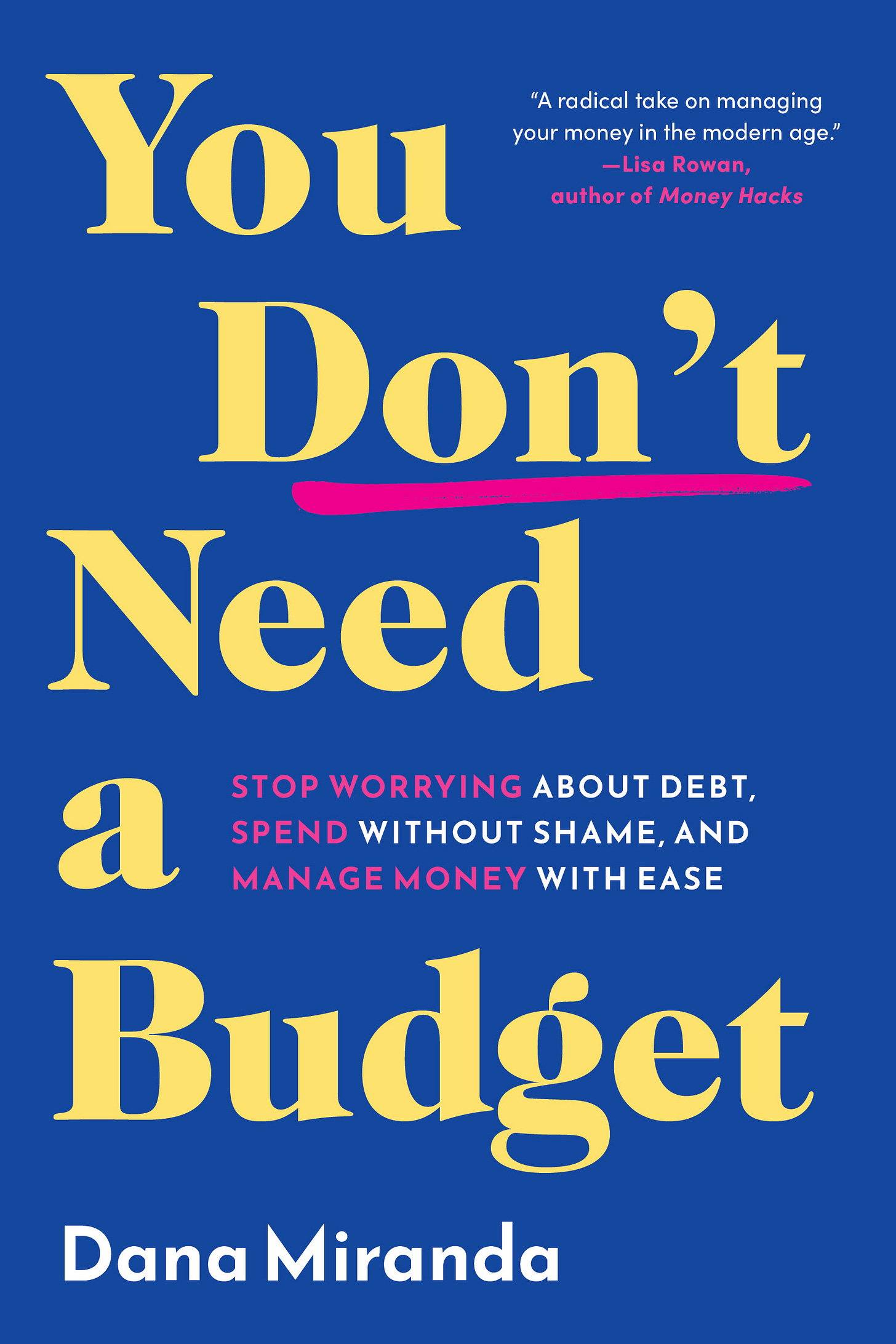How gerrymandering in Texas impacts your personal finances
And why California is right to strike back
With the gerrymandering feud playing out between Texas and California — and more states looking into it — I could understand many onlookers being fed up with electoral politics before the 2026 cycle even begins. News media has a habit of painting this story with broad, both-sides strokes, as if leaders in California and Texas are doing the same thing. It can make you want to throw your hands up and walk away from the whole mess.
But they’re not doing the same thing. And that’s why this development gives me some hope.
California’s response to Texas is the first major example of Democrats striking back against Republicans’ cunning electoral games. But by explicitly designing measures to redraw their maps only if triggered by redistricting in Texas and only temporarily, California lawmakers have shown that Democrats can fight Republicans’ trickery without stooping to their level of disregard for voters.
I’m particular enthralled by this news because I live in a state that was among the most gerrymandered in the country for more than a decade. I see the havoc Republicans have wreaked on Wisconsin against the will of the voters.
Last year, the Wisconsin Supreme Court finally ruled against our gerrymandered maps, which were skewed toward an unrepresentative Republican majority in our state legislature, and we got fairer maps ahead of the 2024 election. Just for fun, I watched the oral arguments in the case, Rebecca Clarke v. Wisconsin Elections Commission, at the end of 2023.
Here’s what I wrote at the time about why we all need to care about gerrymandering, even if you’re sick of partisan politics.
Yes, even gerrymandering affects your personal finances
During one argument in favor of redrawing districts, conservative-backed Justice Brian Hagedorn asked the taunting question on many opponents’ minds: “What’s the acceptable range of Republican– or Democratic-leaning assembly districts or senate districts?”
Attorney Sam Hirsch responded with a succinct summary of the fight for fair maps: “The key question is Which maps are most likely to support, rather than thwart, majority rule?”
“In a year where Republican legislative candidates get more votes statewide than Democratic legislative candidates,” Hirsch continued, “they should control the legislature, and vice versa…It’s that simple, it’s called majority rule.”
This is the question at stake in gerrymandering cases, and our lack of majority rule is why these cases have been popping up around the country like weeds since the latest redistricting after the 2020 census.

The way the maps are drawn in Wisconsin, Democrats would have to get 62% of votes statewide to get a majority of seats in our state assembly, while Republicans would have to get just 44%. Until 2016, a small majority of Wisconsinites identified as Democrats, and now party identification is near 50/50. Yet, Republicans have held nearly two-thirds of the seats in our assembly for the past six elections, even when their candidates have failed to collectively get a majority of votes.
TL;DR: Most Wisconsinites agree with Democratic positions, but we’re being governed according to Republican ideology.
This is more than a political fight
The fight for fair maps isn’t just kvetching from Democrats who don’t win elections. This isn’t about partisan power — it’s about electing representatives who’ll carry out the will of the people, as they’re tasked with doing. Our will isn’t carried out when the people in power aren’t the ones most of us voted for.
Because we’re here to talk about money, let’s talk about how the fight for fair maps is, among other things, about how our lack of small-d democratic representation impacts our relationships with money.
Without fair representation, our legislators aren’t implementing the economic policies people need — and want.
In a recent Pew Research survey, 73% of Americans were in favor of either maintaining or increasing government aid to the poor. Around two-thirds of Americans favored raising taxes on large corporations and high-income earners. Yet, Republican leadership in Congress continues to argue for reducing revenue and cutting services that help the poor.
While the Wisconsin case isn’t challenging U.S. Congressional districts, many others are. As of July 2023, cases in 29 states have launched to challenge congressional or legislative maps, and courts have already ordered new maps in Alabama, Alaska, Louisiana, Maryland, New York, North Carolina, Ohio and South Carolina.
Gerrymandering is about money, because fair maps give us true representation, and true representation is the only way we can be served fairly by our government.
When maps are skewed to create districts where Democrats don’t have a chance to win, Republican candidates in those districts don’t have to work to earn votes. That means, once they’re in office, they don’t have to govern the way people want them to — and our government doesn’t serve us the way it should.
In Wisconsin, that meant cutting public education, despite an enormous store of money in the state. At the federal level, it’s meant calls for raising the retirement age and privatizing Medicare, and an end to the Child Tax Credit expansion that had lifted millions of children out of poverty.
Americans want policies that take care of us and the people in need around us. Those policies would have an enormous impact on your relationship with money and that of so many people around you who’ve been struggling unfairly.
We can’t get those policies unless we fight the gerrymandering that oppresses us under minority rule.

🗳️ Want to learn more about how our culture influences your relationship with money?
My Budget-Free Fundamentals series gives you everything you need to gain a fresh perspective on your relationship with money. In a few short lessons, you’ll gain tools to use money the way you want without relying on restriction, succumbing to shame or following advice rooted in greed. Paid subscribers have full access to this and all Healthy Rich classes.



Thank you for explaining this in terms that the layperson can understand. As a lawyer, I get it but I am often exhausted at trying to break it down for those who only have 30 second attention spans and don't understand why gerrymandering for nefarious purposes, such as, control by the minority rule, is WRONG and un-democratic. Although I read somewhere just yesterday that extreme right MAGA are now casting democracy as "WOKE' and left wing and liberal. Does anyone know what the Constitution was meant to do? Granted the people in charge then were also hypocrites, they didn't want equality or freedom for all, just landowning white males, so I guess it is kind of on brand that they don't want equal rights for women and minorities. We are in deep doo doo.